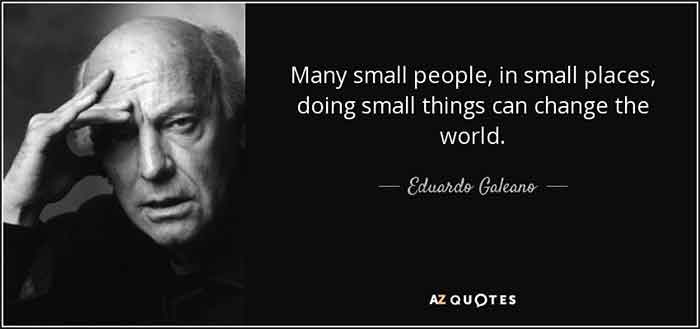
On my first day as a professor of critical writing in a ‘premier’ university, I decided to conduct an experiment in the classroom. I walked in and told the students that ‘today’s class will focus on critical thinking because one logically and chronologically has to think critically first and only then proceed to write critically.’ Saying that, I wrote ‘cultural studies’ on the blackboard and proceeded with my lecture, the first part of which I copy here verbatim—
Some cultures are worse than others. They are backward and barbaric. Those cultures should be destroyed by more advanced cultures. This should be done either by forcefully updating those cultures or by killing off all the people who belong to that culture. The only way to update a backward culture is to enslave the people. Enslavement is the fastest way to make a people learn that they need to give up their old ways of life and adopt the culture of the master race. Today, the black community in America is very advanced. It is only because the whites enslaved them. If whites hadn’t enslaved them, those blacks would still be practicing cannibalism in Africa. Slavery can be good if a certain culture is not able to practice self-rule in the most advanced way. Thus, two things are important for progress. Slavery and consequent advancement through rebellion. And if the people cannot be enslaved, then extermination, for if a backward culture is exterminated, on average the world advances.
After saying all this, I looked at the class and asked if anyone had any questions or if I could move on to the next thing on the agenda. Three hands shot up. Two girls and one boy. I asked them to stand up one by one and ask their questions. All three of them said pretty much the same thing—that what I had said was wrong. I told them to sit down and asked the rest of the students if any of them agreed with the three troublemakers. Some students sheepishly raised their hands while most just stared blankly at me without saying anything. Then I proceeded to scold the three troublemakers harshly for having the temerity to suggest their divinely ordained guru could be wrong and asked them if they thought they knew more about the world than I did. They stood their ground and said that they might indeed know lesser than I do about the world but they were quite certain that what I had said in class could not be accepted as right. After this, another student got up and indignantly shouted that the three troublemakers were wrong and that everything I said was absolutely correct. He further accused the three troublemakers of bringing their ideological biases into the classroom. He received applause from a few others who said they agreed with the boy completely. I thanked the boy for defending me and told him to sit down after showering him with praise for holding such lofty views. Then I asked the students to raise their hands if they agreed with the boy. This time, most of the students raised their hands, even some of those who had agreed with the three troublemakers earlier.
After this happened, I told the class that they had just been part of an experiment. I told them that everything I said was wrong according to me and I was just testing what response I received from the class on uttering such ridiculous things like ‘people should be killed or enslaved for the advancement of the world’. I proceeded to tell the class the importance of critical thinking and of opposing the views one thinks are wrong, no matter who utters those views. I praised the three students who had dared to oppose me at the risk of opprobrium and told the class that these were the leaders among them who refused to be cowed by authority. I proceeded to tell the students that their class was divided into four kinds of people and proceeded to draw this table on the blackboard which I reproduce below—
| Leaders | Followers | Cynics | Reactionaries |
| Those three who raised their hands first and took the risk of going against authority when their conscience didn’t allow them to stay quiet. | Those who did not have the courage to raise their hands in the first instance but followed the leaders in going against authority only when they were sure they could stand behind the leaders. Some of these also raised their hands to support the indignant boy when they thought the authority was with the boy. | Those who didn’t care either way who was right or wrong and only did what they thought was most beneficial to them at any given instant. They only raised their hands when they expected praise for doing so. | Those who thought the authority was right because it advocated slavery. |
Once I drew this table on the blackboard, I reached the crux of my actual lesson that day. What we want to do, in the classroom and in society, is to move people from the last three columns into the first column. We want to make everybody a leader.
Some people might object to this by saying that leaders need followers and hence not everybody can be a leader. I think they are wrong. A leader does not need followers. A leader is a person who can lead himself. Surely, followers crop up wherever a leader is. But we have to keep in mind that the leader comes first, and only then followers follow. There can be a leader without followers, as in the case of solitary men, but there can be no followers without leaders. From this, it only follows that followers need leaders and not the other way round. A society in which everyone is a leader and nobody a follower can exist if the leaders make rules for reaching decisions by consensus. So, nobody needs to be a follower, contrary to the misgivings some people have about discipline and order. Leaders, because they lead themselves, are quite capable of disciplining themselves for the sake of order and prosperity.
The objection might be raised that even if a society can exist with only leaders, that still does not mean that we should only have leaders; for the sake of diversity, we should have the other classes of people too because they do no harm. Firstly, people who fetishize diversity and say it is good for its own sake don’t know what they are talking about. Diversity is good when it helps and bad when it doesn’t. There is no rule of nature that says all kinds of diversity must always be good. So let me make clear that in the case we are dealing with here, every class of persons except leaders actually does do or holds the potential to do harm. Therefore, we must forgo diversity and attempt to only have one kind of people—leaders. Allow me to tell you why.
Let’s start with followers. Of course, since they are followers, they are not capable of doing harm by themselves. But what if they follow cynics and reactionaries like they did in my classroom? A follower cannot even decide for himself whom to follow. Even in that, he follows the crowd or the latest overriding influence upon him. If the crowd goes the right way, the follower goes the right way. But if the crowd becomes a murderous mob, the follower does not have the ability to refuse and becomes a part of the mob himself. If there is a leader to lead followers such that they do no harm, then all is well and good. But, as it often happens, the leaders don’t care about having followers and do their own thing while reactionaries do their utmost to get followers to their side in order to defeat the leaders. In such cases, and such cases are indeed plenty, followers become a menace and cause great destruction. While it is true that followers don’t do harm by themselves, they do have the capability of becoming slaves and adding to the power of cynics and reactionaries to do harm.
Next up, cynics. Cynics are those who do not have principled views on anything and only care about maximizing their profit. There are two types of cynics—passive cynics and active cynics. Active cynics contribute actively to the rise of the reactionaries. As leaders won’t allow them to benefit themselves at the expense of everyone else while the reactionaries will, they are always looking for ways to cut deals with reactionaries and bring them to power. Passive cynics, on the other hand, won’t do any harm and might even seem like the best of all possible people as long as conditions are such that they don’t have to do any harm to maximize their welfare. But, as soon as conditions take a turn for the worse and they have to harm others to benefit themselves, they will not hesitate in doing so. In a society that has a predominance of leaders in power, passive cynics remain relatively harmless. But as soon as the reactionaries gain power, passive cynics rally behind the reactionaries and turn into one of the most dangerous elements of society. How is that? In two ways. Firstly, they provide the back bone to the rule of the reactionaries by providing them the material means to hold on to power. Secondly, they betray the leaders and help reactionaries in liquidating them. Leaders don’t let reactionaries and abject followers come near themselves but it is impossible to know who is a passive cynic till actual conditions expose a man as such. This is why passive cynics are able to maintain a certain closeness with leaders during good times, thus learning everything about them. As soon as times take a turn for the worse, the passive cynics are the first ones to sell all that information they had gathered about the leaders to the reactionaries who would otherwise find it almost impossible to defeat the leaders.
Finally, the reactionaries. The reactionaries are merely those who use the fear and passion of the followers to enslave them. Instead of teaching the followers to be leaders and instead of letting followers to be led by leaders, reactionaries actively work to enslave the followers and use them against the leaders. Reactionaries hold the view that certain men are born to be slaves and certain men are born to be rulers. Thus, reactionaries are the ones most diametrically opposed to leaders, who neither want to be slaves nor rulers. For a person to become a leader, she does not need anyone’s sanction but only has to affirm autonomously that she has the capability to lead herself. If she can make that judgment for herself, it follows that everyone else can also make that judgment for themselves, for the judgment is not based on any external circumstance but only on a self-perceived ability to choose one’s own way. A reactionary does not become a leader but only a ruler. A ruler needs people to rule over as one can’t be a ruler of themselves. A ruler, while asserting his right to rule, does not affirm that everyone can be a ruler but instead says that only he is fit to be a ruler while everyone else must be ruled by him. The ruler gets his legitimacy to rule not from his own judgment but from an external factor, like divine ordinance, caste, gender, education, money, etc., which is differentially distributed among rulers and slaves. The reactionary has two tasks if he wants to maintain his rule. The first is to make slaves of followers. The second is to get rid of leaders who reject to be slaves under his rule. Thus, there is in society always a war going on between reactionaries and leaders. One side which affirms the essential equality of all humans by the way it behaves and another which argues that there must need be slaves for them to rule over. Leaders would not bother with reactionaries if it wasn’t necessary for reactionaries to constantly attack leaders to establish their rule.
After discussing the categories of people that can exist in society, it should be clear that the best thing for a society is to have free men who can lead themselves. It is best to be a society of leaders. It is tolerable for a society to have followers but at no cost can a society allow reactionaries and cynics to preponderate. And yet, as the experiment in my classroom shows, cynics and reactionaries outnumber the leaders and, additionally, they also have many more followers on their side than the leaders do. This should not come as a surprise to anyone who is aware of the last two hundred years of Indian history, as it is clear that reactionaries and cynics have constantly gained ground at the expense of leaders and made evermore slaves of the followers, who are too afraid to stand up for themselves in the absence of leaders who can protect them. The rampant slavery and sycophancy in India today need to be cured by the development of leaders or we will just sink deeper into the morass with each passing day and the time may even come when we are unable anymore to do anything about our wretched conditions.
Leaders don’t develop apart from society. Just like a plant to take root needs the right soil and climatic conditions, so do leaders need the right conditions to be able to survive. Society needs to nurture leaders. Instead, we have a society which zealously hounds and murders leaders with a vicious relentlessness because every leader is a threat to the caste order, which does not brook any opposition and requires total obedience. Thus, it is our task today to just as zealously defend and protect the future leaders from (caste) society. We must create pockets within this society where leaders can be nurtured so that when they break into the scene of the larger society, they are powerful enough to fight the reactionaries and defeat them. The reactionaries have not yet been able to invade our homes and some of our schools. Those are the places where we must create conditions of freedom for our children where they develop their strength and become leaders of the future. It is only in this way that it will be possible to come back from the brink of chaos where we find ourselves today.
* I am not actually a professor and I did not actually conduct any such experiments in class but I have been in enough classrooms to hypothesize such an experiment. Anyone who thinks that the experiment would yield different results is free to contradict me and maybe even prove me wrong by actually conducting the experiment in the classrooms of ‘premier’ universities and colleges in India.
Akshat Jain is a writer currently residing in India. He uses the debate methodology of Syādvāda to piss people off. Like a good Syādvādist, he claims that all his claims fall within the ambit of falsifiability.
GET COUNTERCURRENTS DAILY NEWSLETTER STRAIGHT TO YOUR INBOX

















































